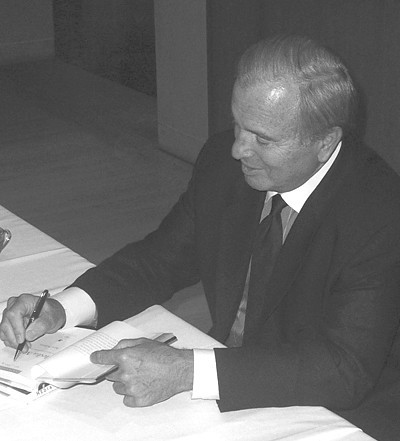
Columnist talks ethics
More than 100 members of the SMU and Dallas communities gatheredTuesday night in Caruth Auditorium to hear the 2004 Rosine SmithSammons Lecture in Media Ethics featuring Ken Auletta.
Auletta, a media columnist for The New Yorker magazineand the author of 10 books, has earned critical acclaim for hiswork as a journalist and most notably his national bestsellers,including Three Blind Mice: How the TV Networks Lost Their Wayand World War 3.0: Microsoft and Its Enemies.
Before an array of SMU students, faculty and administration aswell as professional Dallas journalists, Auletta shared histhoughts on what Meadows School of the Arts Dean Carole Brandtcalled “one of the most powerful concerns of our times andlives; the ethics of media.”
Many SMU students agree with Brandt and attended the lecture tolearn more about the growing role of ethics in the media, as theypursue careers in journalism.
“Ethics should be the number one issue when it comes tojournalism,” junior broadcast journalism major Natalie Dunnsaid. “I don’t think you can be a journalist withoutethics.”
As a media critic, Auletta argued that the media simplifiesevents too much and that what is happening in the media is actuallyvery complex. He mentioned four vices of media-synergy, humility,hubris and bias- and emphasized the role of credibility and trustin the world of journalism.
“We only gain trust as journalists when we displaycredibility,” Auletta said.
In explaining journalists’ responsibility to sources andsociety as a whole, Auletta made references to the latest and mosttalked-about case in media ethics: CBS’ Dateline disaster inrunning a premature story on President George W. Bush’s timein the National Guard based on documents that have since beendiscredited.
According to Auletta, the story that Dan Rather delivered hasbeen “a source of tremendous embarrassment, deservedly, toCBS” and is testimony to what can happen when journalistsbecome more focused on breaking a story first, rather than puttingtogether a piece with the appropriate facts and sources to supportit.
He criticized CBS for taking more than two weeks to respond toallegations that the documents referenced in the Dateline piecewere not authentic, and that backing down and apologizing laterundermined the organization’s credibility.
Auletta also emphasized the relationship between journalists andbusinessmen in media and the increasing disparity in communicationbetween the people that run the media organizations and thejournalists that keep them going on a daily basis.
“We have to learn as journalists how to better communicatewith the people that sign our checks,” Auletta said.
He argued that the strength of a brand is nothing withoutcredibility, and that it should be the role of today’s mediaexecutives and journalists to jointly convey why there is a publicinterest in good investigative journalism.
While there may not be a clear answer as to what role ethicsshould play in the world of journalism, Auletta encouraged membersof the audience to bear in mind the responsibilities to both profitand society, quoting F. Scott Fitzgerald.
“The mark of an intelligent person is the ability to keeptwo thoughts in mind and still function.”
On a sidenote
Ken Auletta, media critic for the New Yorker magazine, satdown for a few minutes with The Daily Campus to answer a fewquestions about his life as a journalist and author. He beganwriting for The New Yorker and the New York Daily News in1977.
DC: “How dramatic was the difference in the twoatmospheres of the daily newspaper versus such a prestigiousmagazine?”
Auletta: “Oh, it was a completely different culture.The Daily News had the deadline pressure of a dailynewspaper… The metabolism of the magazine moved moreslowly.”
Auletta explained the difference in the two atmospheres enabledhim to develop two, simultaneous voices. At the New York DailyNews, his column, long by the newspaper’s standards at1,000 words, contributed a specific, personal point of view.Comparatively, The New Yorker allowed him to “peel theonion” on more in-depth issues. “The more complicated[the issues] were,” he said, “the longer my piecescould become.”
DC: “Did this desire to explore an issue in longer forminfluence your desire to begin writing books?”
Auletta: “I think it’s the path many journaliststake. You start by being a reporter. Then you being to write inlong form and eventually write a book. It uses completely differentmuscles.”








